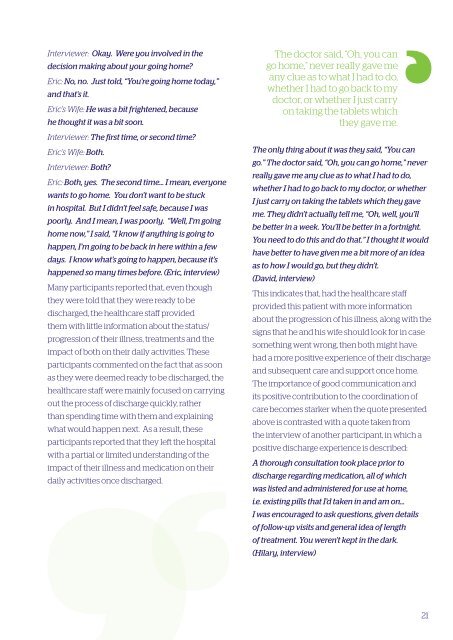Hospital Discharge
3Jzx309Yruj
3Jzx309Yruj
Create successful ePaper yourself
Turn your PDF publications into a flip-book with our unique Google optimized e-Paper software.
Interviewer: Okay. Were you involved in the<br />
decision making about your going home?<br />
Eric: No, no. Just told, “You’re going home today,”<br />
and that’s it.<br />
Eric’s Wife: He was a bit frightened, because<br />
he thought it was a bit soon.<br />
Interviewer: The first time, or second time?<br />
Eric’s Wife: Both.<br />
Interviewer: Both?<br />
Eric: Both, yes. The second time… I mean, everyone<br />
wants to go home. You don’t want to be stuck<br />
in hospital. But I didn’t feel safe, because I was<br />
poorly. And I mean, I was poorly. “Well, I’m going<br />
home now,” I said, “I know if anything is going to<br />
happen, I’m going to be back in here within a few<br />
days. I know what’s going to happen, because it’s<br />
happened so many times before. (Eric, interview)<br />
Many participants reported that, even though<br />
they were told that they were ready to be<br />
discharged, the healthcare staff provided<br />
them with little information about the status/<br />
progression of their illness, treatments and the<br />
impact of both on their daily activities. These<br />
participants commented on the fact that as soon<br />
as they were deemed ready to be discharged, the<br />
healthcare staff were mainly focused on carrying<br />
out the process of discharge quickly, rather<br />
than spending time with them and explaining<br />
what would happen next. As a result, these<br />
participants reported that they left the hospital<br />
with a partial or limited understanding of the<br />
impact of their illness and medication on their<br />
daily activities once discharged.<br />
The doctor said, “Oh, you can<br />
go home,” never really gave me<br />
any clue as to what I had to do,<br />
whether I had to go back to my<br />
doctor, or whether I just carry<br />
on taking the tablets which<br />
they gave me.<br />
The only thing about it was they said, “You can<br />
go.” The doctor said, “Oh, you can go home,” never<br />
really gave me any clue as to what I had to do,<br />
whether I had to go back to my doctor, or whether<br />
I just carry on taking the tablets which they gave<br />
me. They didn’t actually tell me, “Oh, well, you’ll<br />
be better in a week. You’ll be better in a fortnight.<br />
You need to do this and do that.” I thought it would<br />
have better to have given me a bit more of an idea<br />
as to how I would go, but they didn’t.<br />
(David, interview)<br />
This indicates that, had the healthcare staff<br />
provided this patient with more information<br />
about the progression of his illness, along with the<br />
signs that he and his wife should look for in case<br />
something went wrong, then both might have<br />
had a more positive experience of their discharge<br />
and subsequent care and support once home.<br />
The importance of good communication and<br />
its positive contribution to the coordination of<br />
care becomes starker when the quote presented<br />
above is contrasted with a quote taken from<br />
the interview of another participant, in which a<br />
positive discharge experience is described:<br />
A thorough consultation took place prior to<br />
discharge regarding medication, all of which<br />
was listed and administered for use at home,<br />
i.e. existing pills that I’d taken in and am on…<br />
I was encouraged to ask questions, given details<br />
of follow-up visits and general idea of length<br />
of treatment. You weren’t kept in the dark.<br />
(Hilary, interview)<br />
21


